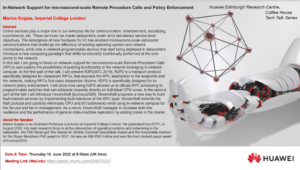【ERC Coffee House Tech Talk Series】In-Network Support for microsecond-scale Remote Procedure Calls and Policy Enforcement [Marios Kogias]
Date
Thursday 16th June @ 11:30 – 12:30 (UK time)
Presenter
Marios Kogias
Affiliation
Imperial
Location
[Physical] TBA
[Online] Meeting link: https://welink.zhumu.com/j/218737227
Abstract
Online services play a major role in our everyday life for communication, entertainment, socializing, e-commerce, etc. These services run inside datacenters under strict tail-latency service level objectives. The emergence of new hardware for IO has enabled microsecond-scale datacenter communications that challenge the efficiency of existing operating system and network mechanisms, while new in-network programmable devices that start being deployed in datacenters introduce a new computing paradigm that shifts functionality traditionally performed at the end-points to the network.
In this talk I am going to focus on network support for microsecond-scale Remote Procedure Calls (RPCs) and explore the possibilities of pushing functionality in the network leveraging in-network compute. In the first part of the talk, I will present R2P2[ATC 2019]. R2P2 is a transport protocol specifically designed for datacenter RPCs, that exposes the RPC abstraction to the endpoints and the network, making RPCs first-class datacenter citizens. R2P2 is specifically designed for in-network policy enforcement. I will show how using R2P2 allowed us to offload RPC scheduling to programmable switches that can schedule requests directly on individual CPU cores. In the second part of the talk I will introduce HovercRaft[Eurosys2020]. HovercRaft proposes a new way to build fault-tolerant services by implementing fault-tolerance at the RPC layer. HovercRaft extends the Raft protocol and carefully eliminates CPU and I/O bottlenecks while using in-network compute for the fan-out and fan-in management. As a result, HovercRaft manages to increase both the resilience and the performance of general state-machine replication by adding nodes in the cluster.
Short Bio
Marios Kogias is an Assistant Professor (Lecturer) at Imperial College London. He graduated from EPFL in August 2020. His main research focus is at the intersection of operating systems and networking in the datacenter. His PhD thesis got The Dennis M. Ritchie Doctoral Dissertation Award and the honourable mention for the Roger Needham PhD award in 2021. He was an IBM PhD Fellow and won the best student paper award at Eurosys2020.





Comments are closed
Comments to this thread have been closed by the post author or by an administrator.